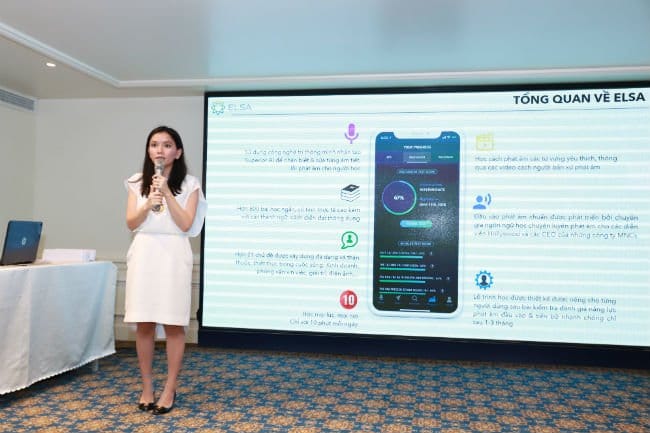by RJ Balmater

Roving between the company’s three offices in the U.S., Europe and Asia, ELSA CEO and co-founder Vu Van has few moments to spare. But if you do reach her for a conversation over the phone or Facetime, you may have a hard time placing her accent. Vu now lives in the San Francisco Bay Area, but when she first moved from Vietnam to earn a masters in education and business from Stanford University, she struggled to be understood.
“[If] you talk to the 1.5 billion people learning English in the world, 90% of them really, really are struggling with speaking and being understood,” she said. “Not because they don’t know English, but because… they don’t pronounce it correctly, so people had a very hard time understanding them. So that hurts their confidence. They withdraw, they return to reading and writing, but they don’t speak.”
Keen to tackle that challenge, Vu and co-founder Xavier Anguera developed ELSA (English Language Speech Assistant). The company’s friendly software solves a core problem in English language instruction—helping learners sound more like native speakers. ELSA uses artificial intelligence to train users toward a basic, easily understandable dialect: the American “Midwestern” accent.
Vu could quickly see that they had latched onto a critical need: more than 10,000 users joined a waiting list before the first product launch. After nine months of research and testing, the team launched its proprietary software in 2016 to a resoundingly positive reception. The momentum has continued to build: In February 2019, ELSA announced a $7 million Series A led by Gradient Ventures, Google’s dedicated AI fund. (ELSA is its first investment in Asia.) Now, ELSA is working to develop its machine learning capabilities to better react to students’ most common errors.
A Rapid Kickstart
ELSA first took off at SXSW 2016, Austin’s annual celebration of music and innovation. After ELSA won the top prize in the Launch Startup competition, the app was downloaded more than 30,000 times in 24 hours, Vu said.
“Even now, we don’t pay for marketing to acquire users at all,” she said. “We rely on the vitality and the organic part of it because once people know about the product, they really like it.”
Vu said the app captured early interest because it stands apart from apps like Duolingo and more traditional programs like Rosetta Stone. Those programs teach vocabulary and grammar, while ELSA trains users to modify their accents based on their ongoing performance.
When ELSA made its appearance, many in the English language learning space questioned whether ELSA could—or should—replace traditional, in-person language classes or one-on-one tutoring.
But ELSA isn’t aiming to replace teachers. Instead, the firm sees itself as a classroom supplement. In its largest market—Vietnam—the company is even building a classroom curriculum to support public school teachers’ English instruction. In these pilot classes, teachers hold licenses for their students and load their own lesson plans into ELSA’s software; this way, students can review the lessons they learned in class, even when they can’t hear the teacher correctly pronounce the terms.
“They know the grammar,” Vu explained. “They know how to put together a phrase and a sentence. And also, with ELSA, they know how to speak correctly. The next time they speak, people will understand them because they pronounce it right.”
Responding to the Growing User Base
Vu had initially budgeted for marketing and PR, but given the company’s early—and sustained—success, ELSA has captured enough consistent user data to continuously inform product development and modification, she said.
That data has offered powerful lessons. When she first developed the UI, for example, Vu believed that users would crave the same pride and pleasure they get from other smartphone features like messages and mobile games. She quickly realized, however, that users sought something else from ELSA.
“What was very surprising is that people are so mesmerized—and it’s transformative for them—to say, ‘Oh my god, I’ve never known that I spoke that word wrong for the last 10 years. Finally, somebody told me that I’m wrong.’ And they just get super happy to know that they’re wrong,” she said.
With that in mind, the team adapted the app: instead of pushing users through a learning sequence on a predetermined timetable, ELSA lets them repeat levels until they feel that they’ve mastered the sounds.
Since ELSA’s founding in 2015 and rise to fame in 2016, the initial momentum has hardly slowed, Vu said. The team doubled after Monk’s Hill and others invested a total of $3.2 million in the company’s pre-Series A round. As a result, ELSA has grown its technical team while simultaneously streamlining operations and establishing its brand. The new Series A funds should spur even more growth.
Today, Vu jets between three offices in Lisbon, Ho Chi Minh City and the Bay Area, handling different aspects of company growth at each office. She’s also in the midst of the next financing round, so Vu is consistently refining her pitch and outlining the company’s future goals: more classroom partnerships, a new office in Japan to capture that growing market, and of course, reacting to English learners’ changing needs. For those with an ear to the English language market, that all sounds very promising.

